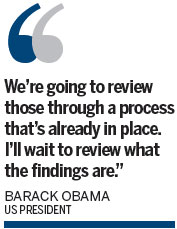US may put DPRK back on terror list
US President Barack Obama said his government is reviewing whether to put the Democratic People's Republic of Korea back on its list of state sponsors of terrorism, as Washington decides how to respond to what he calls an "act of cybervandalism", not one of war, against a movie company.
Pyongyang has reacted angrily to Obama's comments that blame it for the hacking of Sony Pictures Entertainment, warning of strikes against the White House, Pentagon and "the whole US mainland, that cesspool of terrorism".
The long statement from the DPRK's National Defense Commission late on Sunday also underscored Pyongyang's sensitivity about the movie, whose plot focuses on the assassination of DPRK top leader Kim Jong-un.
Pyongyang, now on the defensive over the US accusation of hacking, refused to take part in a groundbreaking UN Security Council meeting on Monday, during which the country's human rights situation was to have been discussed for the first time.
Sony Pictures, which said it canceled the theatrical release of The Interview after distributors refused to show it, pledged to find a way to get the film out. "How it's going to be distributed, I don't think anybody knows quite yet," a Sony lawyer said.
Obama is promising to respond "proportionately" to an attack that law enforcement blames on Pyongyang. "We're not going to be intimidated by some cyberhackers," he said.
The president said the US will examine the facts to determine whether the DPRK should land back on the terrorism sponsors list.
"We're going to review those through a process that's already in place," Obama told CNN's State of the Union in an interview broadcast on Sunday. "I'll wait to review what the findings are."

While raising the possibility of a terrorism designation, Obama also asserted, "I don't think it was an act of war. I think it was an act of cybervandalism that was very costly, very expensive. We take it very seriously."
The National Defense Commission, led by Kim, warned that its 1.2-million-member army is ready to use all types of warfare against the US.
"Our toughest counteraction will be boldly taken against the White House, the Pentagon and the whole US mainland, the cesspool of terrorism, by far surpassing the 'symmetric counteraction' declared by Obama," said the commission's Policy Department in a statement carried by the Korean Central News Agency.
Pyongyang spent two decades on the list until the George W. Bush administration removed it in 2008 during nuclear negotiations. Only Iran, Sudan, Syria and Cuba remain on the list.
But putting the DPRK back on the list could be difficult. To meet the criteria, the US State Department must determine that a country has repeatedly supported acts of international terrorism, a definition that traditionally has referred to violent, physical attacks rather than hacking.
AP - AFP
(China Daily 12/23/2014 page12)


















